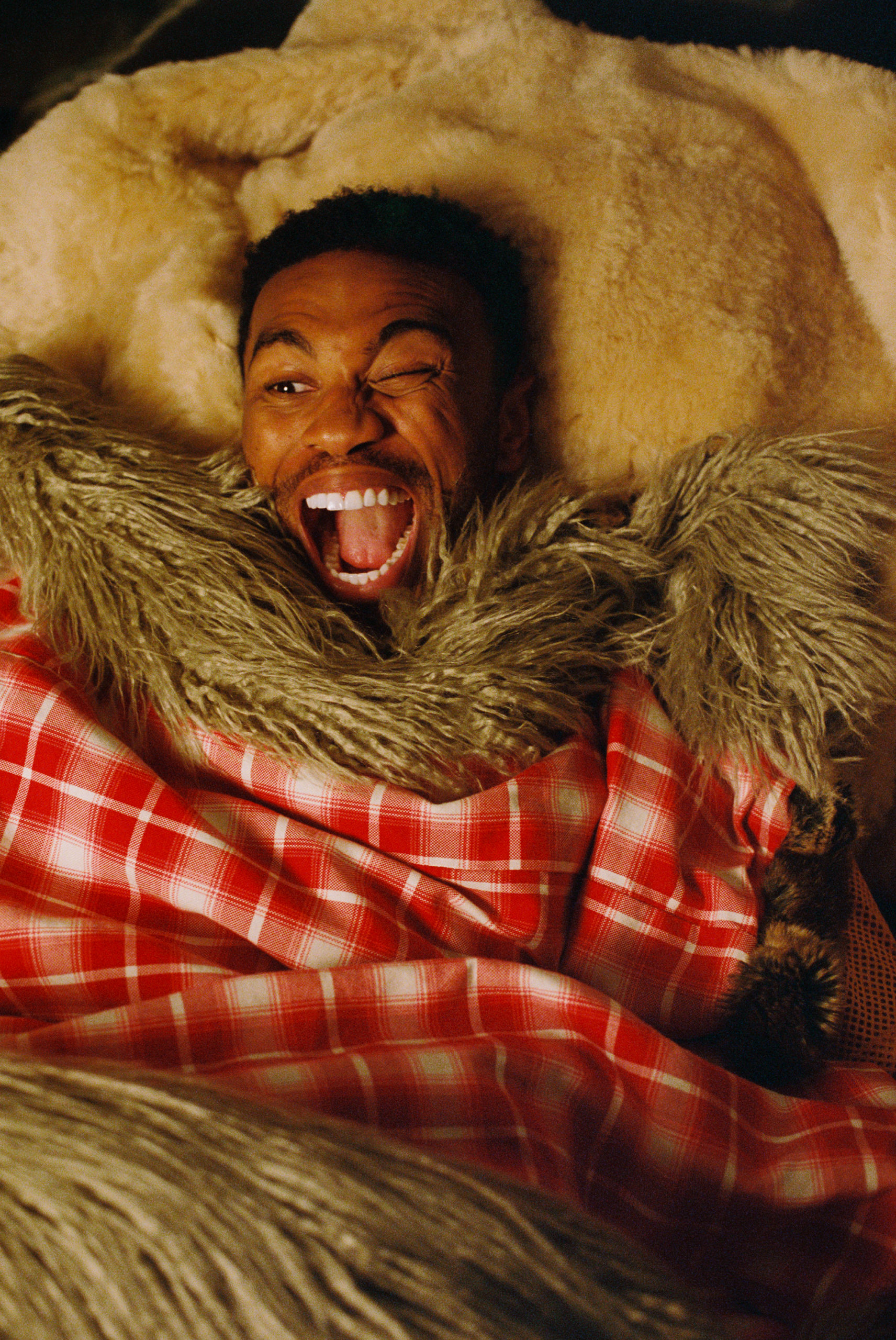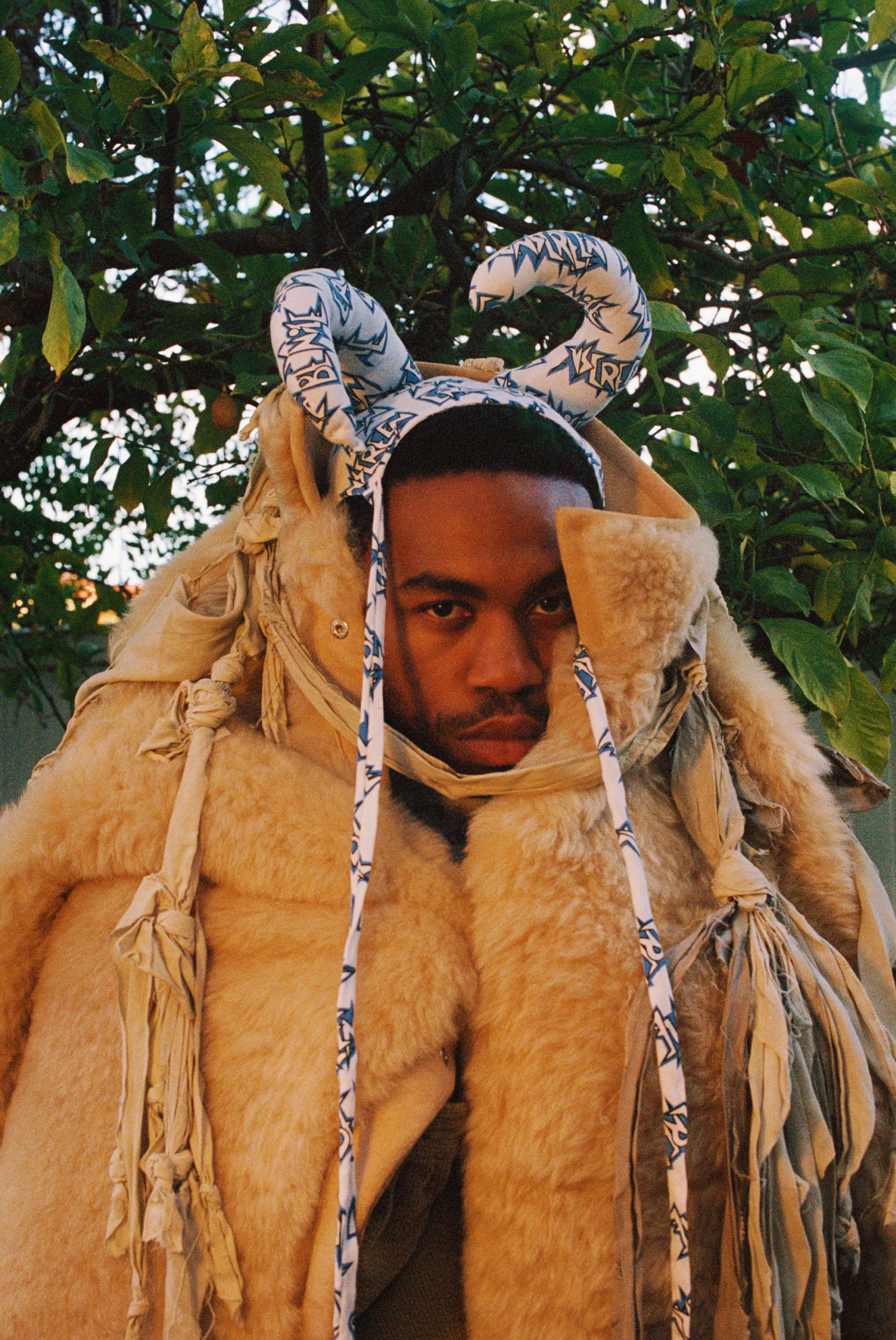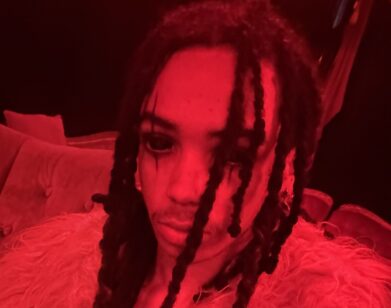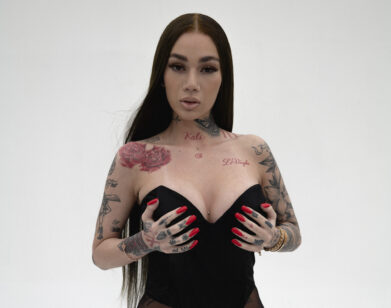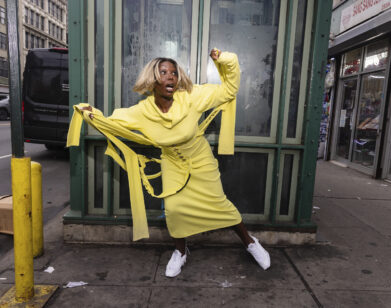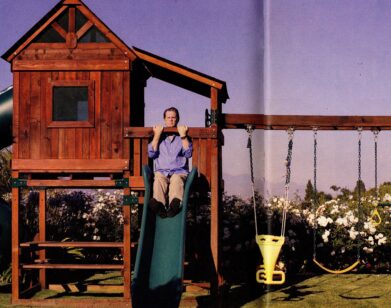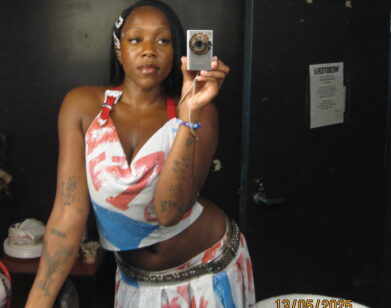Kevin Abstract’s Pursuit of Happiness
By the time he was out of his teens, the visionary queer rapper Kevin Abstract had already founded what would become Brockhampton, one of the 21st century’s most ambitious and essential music groups, and run away from his conservative Mormon family to make it on his own. Now 25, he’s grown up in public, releasing albums both sexually and sonically adventurous, while pulling stunts like livestreaming a ten-hour run on a treadmill. Ahead of his next solo album, he sits down with Tremaine Emory, the founder and creative director of Denim Tears and half of nightlife incubator No Vacancy Inn, to talk about survivor’s guilt, the validation loop, and why happy music is harder. —JESSE DORRIS
———
TREMAINE EMORY: I wanted to start off with something you talked about in your interview with Rick Rubin, which was survivor’s guilt, and how that affects your music, your career, and your life. Most people don’t become successful at making a living off of art. I believe that if you make the art and put it out into the world the way you want it to be, you’re successful. But as far as being able to make a living off of art that takes you out of the nine-to-five, especially coming from the places where we come from as African-American—I just wanted to start the conversation with that.
KEVIN ABSTRACT: I don’t know how to deal with it. I’m constantly trying to keep up with the younger-versions-of-myselves’ earliest dreams and ambitions. And that’s been the greatest distraction, I guess. Because the guilt really can affect me in a negative way and hurt my creativity and hold me back. There’s just so much that I want to do—and so much that I want to do for other people in my life as well. And I feel so lucky, honestly. It trips me out.
EMORY: Do you feel jaded at all?
ABSTRACT: Anytime I start to feel comfortable I can become jaded. It’s the worst place for me to be, so I try to avoid it and go as far as I can in the opposite direction. What about you? Do you feel that way?
EMORY: I feel jaded by what I call “posthumous admiration.” Sometimes people who have known me now want to say something because I’m in the Met or because Marc Jacobs wore my clothes. And then it’s like, “Do you really like it, or do you like that it’s popular?” So that’s when I get jaded, when I feel that any appreciation is coming from validation of outside things and not from what people think of my work or of me as a person.
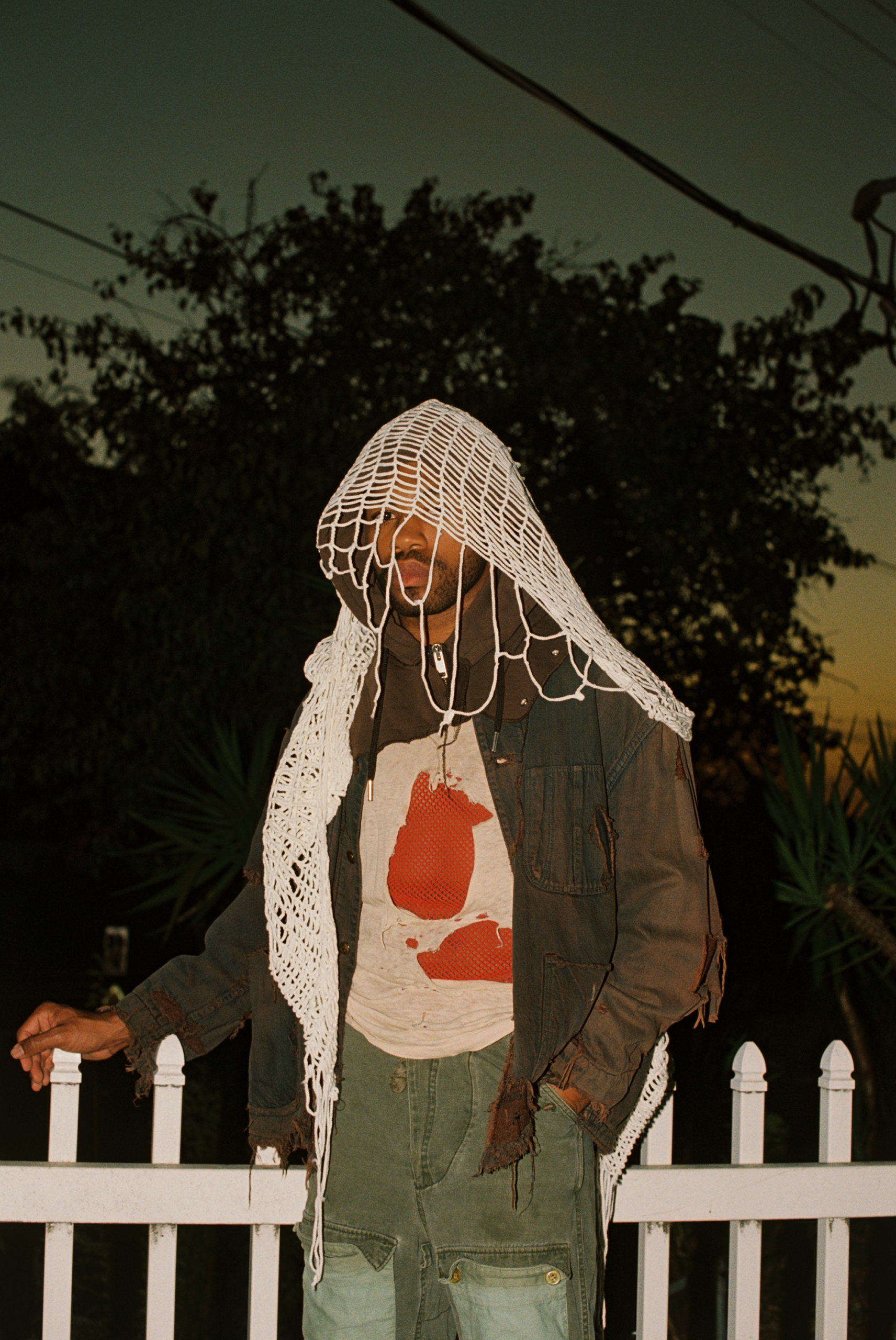
Sweater and Hood by Givenchy, Vintage Jacket and T-shirts from Palace Costume, Pants by Mihara Yasuhiro.
ABSTRACT: Does that have negative effects on the next thing you make? Or does it keep you motivated?
EMORY: It keeps me like, “Okay, then I’ve got to keep pushing.” Because thousands of people are wearing the denim with the cotton wreath, which I’m really grateful for. But I’m also like, “What’s the next thing that is not seen as much in popular culture, that I can push into popular culture using my design and my ability to socialize ideas?”
ABSTRACT: That makes sense.
EMORY: We’ve been having some interesting DM and text exchanges about Lil Nas X and how amazing “Industry Baby” is. It’s what he’s rapping about, the video, and how hard he’s rapping, the level of confidence. I know I’m preaching to the choir, but how do you feel about that? It’s so amazing that exists now—a Black man rapping about his sexuality.
ABSTRACT: The most beautiful thing about it is that there’s no fear, and you can feel it from watching the video, listening to the song, and the tone of his voice. And even with how he promotes it—just how proud of it he is. That has me so inspired to go big and not shy away. Because I think sometimes, when I’m being vulnerable with my music and my art, it’s easy for me to get scared and want to hide it because it’s so personal. Seeing him transcend these personal emotions and stories and translate them in a pop way has really inspired me.
EMORY: Totally. There’s another song, “Sun Goes Down,” where he says that when he was a kid, he’d pray to Jesus to make him not gay. That shit made me so emotional because I know there’s a kid that is gay hearing that. There wasn’t always music and popular culture like that. Lil Nas X is one of the biggest artists in the world right now, saying that. And with Frank [Ocean] and you and others, sometimes I feel like people have gotten so used to a Black man being openly who they are in front of the whole fucking world, but that ain’t easy. It’s a big fucking deal. Because the whole LGBTQ community has had to live in the shadows for so long. Where do you want to be in that discussion?
ABSTRACT: To always be putting my one thousand–percent authentic self into the work, so that it’s providing some sort of a voice for someone who needs it. I know that there’s always going to be someone out there that can relate to a random feeling I have. So I’m definitely aware of the responsibility when I’m making stuff, but I feel like in order to really help people, I have to focus on what I’m feeling that day, and what the work means to me, and what my emotion means to the work and how those two things go together, to help paint that bigger picture.
EMORY: I feel that, because your whole life isn’t about being homosexual, just like our whole lives aren’t about being Black. Even though those things are innately a part of your life, you don’t need to get to a point where they put you in a box.
ABSTRACT: Right. And it’s easy to get caught up with that stuff, because the audience will send you so much praise for representing them. I can become addicted to that praise and think, “I’ve got to do that again.”
EMORY: There’s a validation loop.
ABSTRACT: Yeah. But the key to real success is to fully be me when I’m making something. That’s how I actually get the validation and the praise that I want.
EMORY: To me, each album is a movie. What’s the movie for what you’re working on with this next album?
ABSTRACT: I always go back to either Spike [Lee] or Paul Thomas Anderson, and right now I’m super into the ’70s. I’m rewatching Boogie Nights a lot. I like the idea of making music that feels like a party and a celebration, and giving people a reason to go out and move and dance and feel free. That’s where my head is right now. It’s easy for me to make something that’s melancholy or moody or sad. Happier shit is harder for me to do.
EMORY: Why?
ABSTRACT: It’s funny, because I love listening to happy music. I love going out. But making stuff feels like therapy for me, so my brain goes to the darker side every time.
EMORY: I’m similar.
ABSTRACT: I have a question for you. Do you have anyone whose career you’re using as a blueprint to shape your own?
EMORY: Andy Warhol and Miles Davis, because they built the system of working within a community and a tribe of people that kept volving throughout the decades. They never rested on their laurels or became old heads. They became OGs. Miles was always embracing the younger generation, but not trying to be young. He was like, “Oh, psychedelic and rock. How is this influencing me? And what can I make?” I feel the same about Warhol in the sense of the Factory and him making films and paintings, then also producing The Velvet Underground and putting out books and Interview magazine. He saw everything as art.
ABSTRACT: How do you think Miles was able to not be corny when he tapped in to the younger generation and applied it to his shit? I’m trying to figure that out, too. I feel like the success I’ve gotten so far is from a very unique sound, but a part of me sometimes hears shit that’s hot and modern and wants to apply it to my craft. But I don’t want to do it in a way that seems forced.
EMORY: It’s because Miles really lived that shit and he never tapped out. The kids know when you’re reaching for relevance. His band would also change every four to five years to get in new blood. So I think that’s another part, too, really supporting a scene. If you’re not trying to support the scene that you’re drawing inspiration from, you’re just ripping them off. You need to bring them into your world as much as you go into theirs. A perfect example of that is Bon Iver, Chief Keef, and Kanye on “Hold My Liquor.” Ye probably was in his mid-to-late thirties when Yeezus was made, and I think he was able to connect with Chief Keef in a way that his contemporaries couldn’t because he didn’t just go into Chief Keef’s world. He brought Chief Keef into his world too, like, “I don’t want a verse from you. I want you on the hook. And I want you basically doing a duet with Bon Iver.” So, when you’re offering as much as you’re taking, that’s when it ain’t no corny shit. It was like, “Yeah, I’m getting Chief Keef on my album and he’s the hot new artist, but also I’m giving him something he never would have done on his own. And he’s giving me something I never would have done on my own.” When it’s this mutual exchange, then it’s real. Those are the artists that stand the test of time and keep making interesting stuff.
ABSTRACT: Exactly.
EMORY: I wanted to ask you about style. You have great style. In my opinion, a lot of your peers in rap are just chasing trends, chasing designers, and not really dressing based on what fits well on their body, what colors look good on them, and what they love. It’s just a competition. What drives your style?
ABSTRACT: There’s this old Ye quote where he’s hanging out with Spike Jonze for a day and he said that when he was younger, he would just try to dress like the Hype Williams videos. And I feel like anytime I’m putting an outfit together, I’m thinking about my favorite music videos or movies and just trying to live in that world. So I’m looking at what’s popping, but I’m never like, “I want to do that because it’s popping and trendy.” If it doesn’t make sense at my core, I won’t go near it. But right now I really care about silhouette and colors and overall appearance. It’s an art that I want to get way better at.
EMORY: Watching your style grow through the years, I could see you becoming more obsessed with silhouette and how things fit on your body and the way the colors of the clothing are bouncing off of each other. I can also tell the certain types of graphic language that you’re attracted to, and it’s dope, because that is art. I see a lot of kids that are fly, but I also see a lot of people that may be more concerned with the thing, the item, rather than personal style and fit.
ABSTRACT: And what it means emotionally, too. Why you’re attracted to that specific green or something.
EMORY: Yeah, and that comes off when you rock the thing. You can go and grab something because it’s hot. But if you don’t really believe it and emotionally connect to it, it’s going to come off in the way you wear it, the way it sits, how comfortable you look with it on your body. That’s maybe the crux of this larger conversation we’ve been having, like with Lil Nas X’s verse on “Industry Baby” where he sounds mad comfortable, and how he wears exactly what he wants. You know what I mean? When I was watching The Last Dance with my chick, she wasn’t very familiar with the Bulls because she’s British, and when Dennis Rodman came on she was like, “Rodman’s the one.” All of the players at that time were jiggy, but Rodman had that different thing. And I think “that different thing” is actually just doing a hundred percent what you want to fucking do. That’s the real war, for an artist and a human being.
ABSTRACT: It’s hard for a lot of artists to do that when you see your peers taking off doing something you wouldn’t usually do. And you’re like, “Fuck, maybe if I lean that way, I might get that, too.” That’s why it’s the toughest challenge.
EMORY: Are there other things you want to do that you think the success of your music career is keeping you from trying or having the time to do?
ABSTRACT: In a lot of ways it’s helped me and given me the opportunity to invest in my own ideas. I can take the money that I’ve made off of music and put it towards making a short film or directing some high-budget videos for BH. And it feels kind of like film school. So I don’t think I’ve been holding myself back. And now it’s using that as an opportunity to really elevate everything and learn as much as possible and fuck up while I’m still young. I know PTA [Paul Thomas Anderson] did Boogie Nights when he was 27. That’s the type of shit that makes me want to put my head down and go super hard and see where I could take it. I love the idea of not making music for a long time and focusing on whatever. Anything. I do think at the core, though, cinema has always been the main thing I’m attracted to. I only started rap- ping because I was obsessed with Will Smith. I realized he was a rapper first so I was like, “I’m going to rap.” But I wanted to be an actor before that. I’m leaning into that.
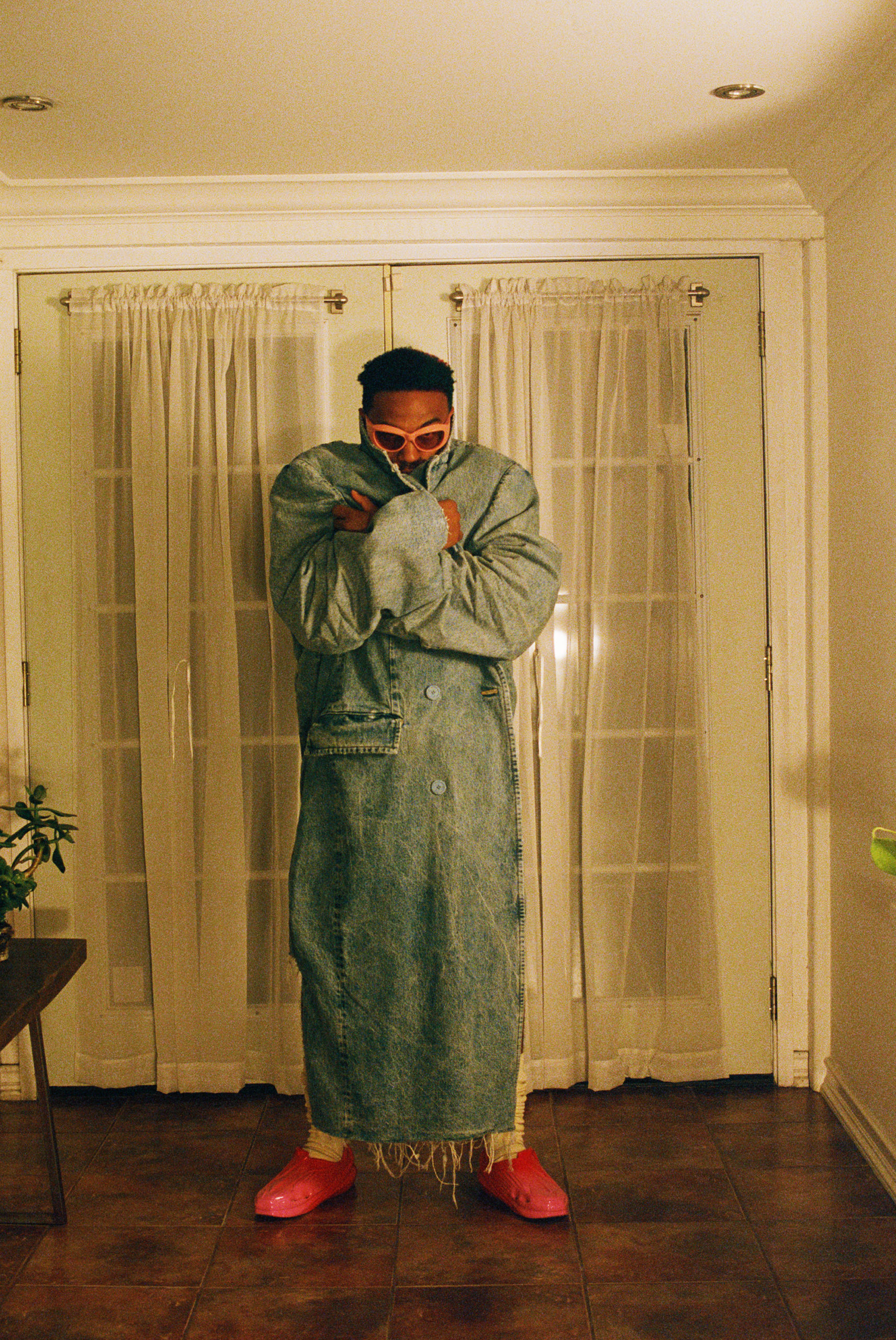
Coat by Balenciaga, Sunglasses and Socks (worn throughout) Stylist’s Own, Shoes (worn throughout) ALYX.
EMORY: The last thing that I wanted to discuss is the role of art and the artist. To me, art is what takes people out of the monotony of everyday life. That’s why people love film so much. That’s why musicians become heroes. Because for three fucking minutes, that song takes you out of the monotony that the system tries to have you in. The system puts everyone in a box to keep things going in this world. Art makes people dream. And sometimes they dream enough to break out of that box. I don’t think society was telling you that you and your guys could create Brockhampton or that you could be Kevin Abstract. You’re from Houston, right?
ABSTRACT: Yeah, Houston–slash–Corpus Christi, back and forth.
EMORY: So there was a route for you and you broke out of it with success in the music world. Do you feel that you’ve now been put in a different kind of box that you have to break out of ?
ABSTRACT: I definitely think so. Even Brockhampton calling ourselves a boy band made me feel like I have to show that I deeply love and appreciate the art form of rap. So, that’s just one thing where I feel like I’m put in a box. But, man, in almost every way I feel like that, which I think is a beautiful thing for me, because whenever I feel doubt or like people aren’t really believing in me, it pushes me to study more, to learn more, and to work harder and outdo myself. So it doesn’t scare me when I begin to feel this way. And it’s interesting that you ask me this as I’m feeling it the most. It motivates me. It keeps me going.
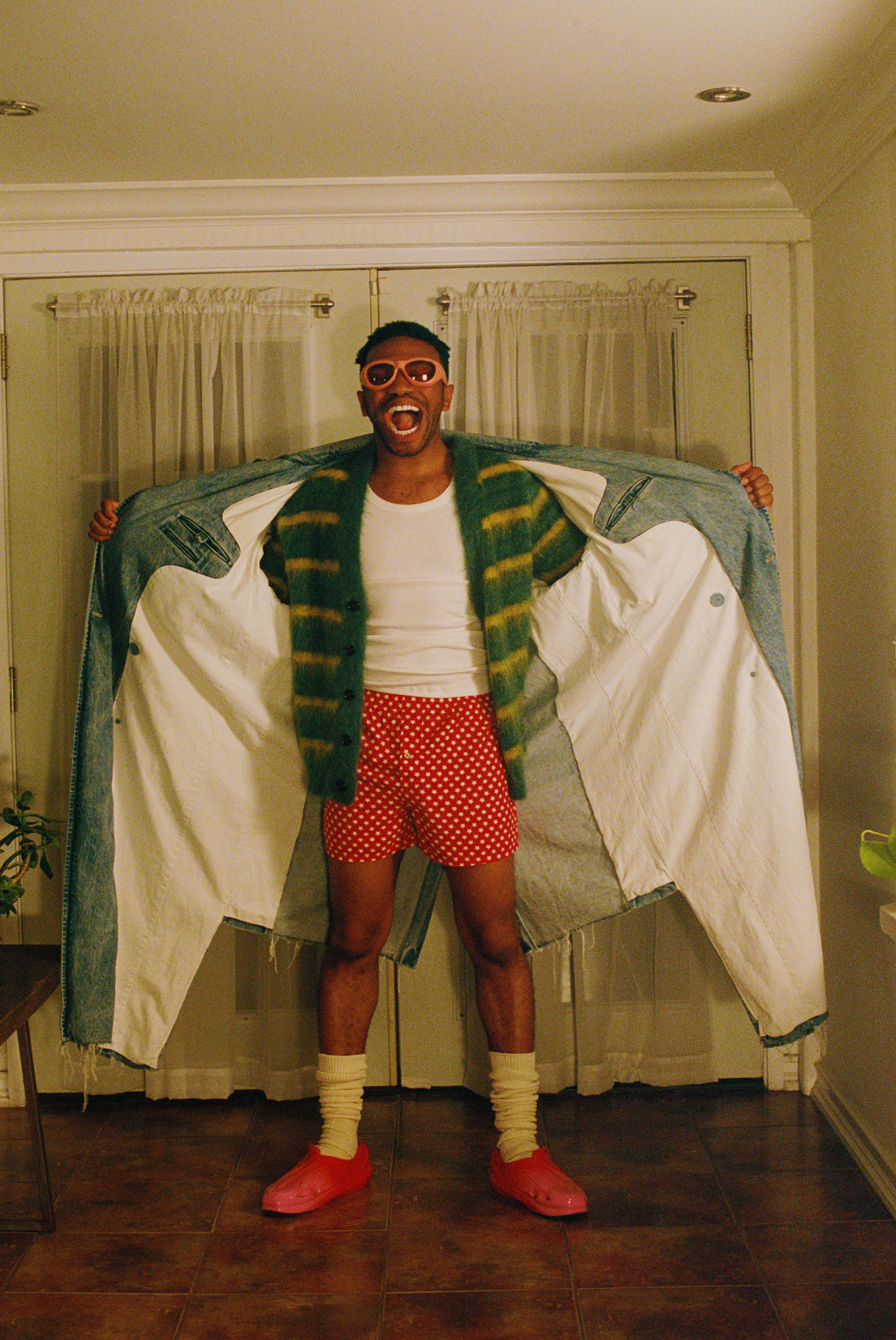
Coat by Balenciaga, Sweater by Marni, Tank Top by Alexander McQueen, Vintage Boxers from Palace Costume.
———
Grooming: Lando
Fashion Assistant: Kyle Bisc
Style Assistant: Nick Holiday

